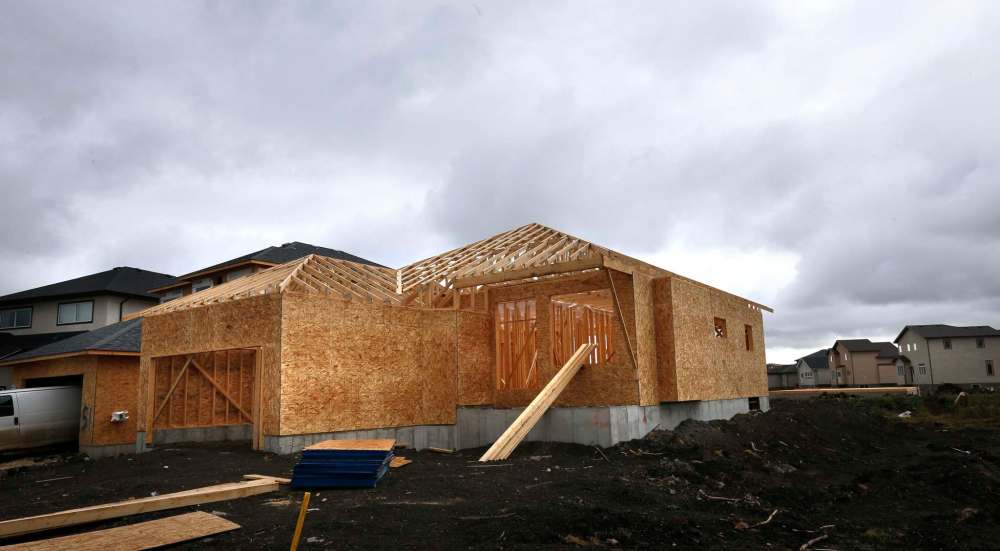Bowman proposes slow, phased-in development fees to extinguish firestorm
Advertisement
Read this article for free:
or
Already have an account? Log in here »
To continue reading, please subscribe:
Monthly Digital Subscription
$1 per week for 24 weeks*
- Enjoy unlimited reading on winnipegfreepress.com
- Read the E-Edition, our digital replica newspaper
- Access News Break, our award-winning app
- Play interactive puzzles
*Billed as $4 plus GST every four weeks. Offer only available to new and qualified returning subscribers. Cancel any time.
Read unlimited articles for free today:
or
Already have an account? Log in here »
Hey there, time traveller!
This article was published 14/10/2016 (3064 days ago), so information in it may no longer be current.
Mayor Brian Bowman wants to phase in growth fees over three years in a plan that could end a bitter standoff with developers and the construction industry.
Bowman said Friday he’s recommending a reduction in the fees originally proposed by Hemson Consulting and recommended in a September administrative report. The city would begin collecting fees for residential developments next May.
He said since the administration report was tabled, he has heard many ideas from different stakeholders about the impact fees. Based on those discussions, he said Coun. John Orlikow (River Heights) will be bringing forth a motion to next week’s executive policy committee (EPC) meeting. Bowman said he will support the motion.

“I believe the changes recommended for EPC’s consideration represent a fair and balanced approach and path forward,” Bowman said at a press conference on Friday afternoon.
The impact fee, designed to support infrastucture growth but reduce the financial burden on people paying property taxes, will be implemented using a phased-in approach, Bowman said.
During the initial phase of implementation, the reduced fee will apply only to residential developments in new and emerging neighbourhoods. Commercial, office, industrial and institutional developments will be exempt from any fee for two years, and residential infill projects located downtown and in mature neighbourhoods will be exempt for three years.
The plan also calls for the establishment of a working group comprised of elected officials, city administrative staff and industry and community groups to advise on the fee’s implementation.
After the administration report was released and became kindling for the firestorm that followed, property and planning committee chairman Orlikow was directed to investigate opportunities for compromise.
“I have spent a significant amount of time listening and speaking with over 40 different stakeholders about impact fees,” he said in the news release. “I believe a phased-in, structured approach to implementing an impact fee together with active, collaborative and constructive industry input throughout the phase-in period is the best approach.”
Mike Moore, the president of the Manitoba Home Builders’ Association, said the plan is “completely unacceptable.”
“It’s a reckless procedure on behalf of the city and we will challenge the legal authority of the city to implement this tax,” Moore said, noting it’s too late to offer a working group once the bylaw is in place. “We’ll be presenting to EPC to hopefully allow the members of EPC and ultimately the members of council to reconsider and not pass it at council at the end of October.”
Coun. Janice Lukes, speaking with media outside the mayor’s office, said she was concerned about whether enough planning has gone into coming up with the fee, how funds raised from the impact fee will be allotted, and that the “level of trust” in working developers in the city has been broken.
“To me this is a rather surprise. It’s a fast-moving place at a fast-moving pace,” Lukes said. “I see now that instead of the CFO (chief financial officer) deciding (where the funds go), now council decides how the funds are going to be allocated from the impact fee with recommendations from the CFO. I’ve seen a lot of wonky things go on here at city hall when council decides how funding is allocated and that concerns me.”
The issue blew up after Hemson Consulting reported that developers were not covering all of the infrastructure costs connected with new construction projects.
Bowman has said taxpayers cannot afford to cover the costs, but industry officials argue they’re paying their fair share for things such as roads, curbs, gutters and sewers in new subdivisions.
The Hemson report proposed a range of fees for new residential and non-residential development. For example, new homes would be subject to a fee of $10 per square foot.
kristin.annable@freepress.mb.ca






